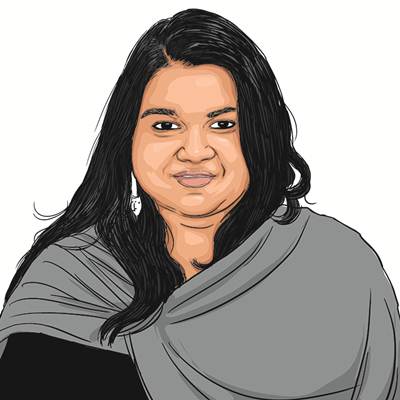Opinion How Ambedkar’s dream became India’s reality
Babasaheb's ideas of cooperative federalism with equality, fraternity, and liberty at its core, comes to fruition with 'sabka saath, sabka vikas'
 For the transformation of India into a progressive, inclusive nation, Ambedkar had a clear vision as to how we must achieve it. (File photo)
For the transformation of India into a progressive, inclusive nation, Ambedkar had a clear vision as to how we must achieve it. (File photo) The ideas and ideals of Babasaheb, whose birth anniversary is today, on April 14, still guide and motivate us. But there’s another special date to remember — January 26, the day we adopted the Constitution in 1950. This year, our Constitution turned 75. Whenever we find ourselves at the crossroads of a constitutional dilemma, we find ourselves turning to the Constituent Assembly debates and the words of Babasaheb, hoping that they will guide us in resolving not only our constitutional quandary but also our moral and social ones. Babasaheb’s last speech on the floor of the Constituent Assembly on November 25, 1949, is of great importance to understand his worldview on independent India’s destiny, democratic values, idea of development and progress. The speech was an emotional one, filled with pride and jubilation on the eve of his motherland gaining Independence and becoming a republic, “once again”. He also reminded the present and future generations of pitfalls to be wary of and ways to navigate them.
In India, democracy has come a long way in the last 75 years. It has survived the misuse of its constitutional power, as well as long and specious bouts of irresolute administration. Babasaheb had cautioned that the parliamentary democracy we have given to ourselves has to be safeguarded not only from outside forces but also from the “infidelity and treachery of her (the nation’s) own people”. He pointed out that in addition to “our old enemies” (in the form of caste and creed), we will be facing political agendas serving the narrow interests of political parties, against which we must “defend our independence with the last drop of our blood”. India has seen a long arduous journey of transformation from a politics of appeasement to a politics of aspiration. Today, from GST to Nari Shakti Vandan Adhiniyam, to the removal of Article 370 and most recently, the Waqf (Amendment) Bill, 2025, we are seeing a much-awaited change in political discourse. Recent election results show a momentum of change wherein GYAN — garib (poor), yuva (youth), annadata (farmers) and nari shakti (women empowerment) — have come together to evaluate political parties not on appeasements but on assurances. Women and farmers are asking for guarantees, not giveaways. The youth and the poor are looking beyond poll promises of phantom jobs and dole-outs and voting for clear roadmaps and policy initiatives to fulfil their aspirations.
For the transformation of India into a progressive, inclusive nation, Ambedkar had a clear vision as to how we must achieve it. The essential condition was not losing sight of a “constitutional method of achieving social and economic objective”. He reminded us that the country we have inherited from the colonisers is mired in social and economic inequalities, but we must resist the temptation to seek “unconstitutional means of achieving social, economic objectives”. He further pointed out the important aspect of aspiring for “fraternity and a sense of common brotherhood”, however difficult it may be. Present policy initiatives such as Jan Dhan Yojana, Mudra loans, Mahila Samman Nidhi, PMGKAY, Sukanya Samriddhi Yojana, Ujjwala Scheme and Startup India and Make in India have given the common people the trust and confidence that, given the opportunity, they themselves can level the social and economic plane. These policy initiatives have created a conducive environment to foster self-help groups, micro entrepreneurship, and women’s empowerment. Direct Benefit Transfer (DBT) to women has not just put money in their hands but also given them the agency for upward socio-economic mobility through small ventures to sustain the family beyond cash transfers. These are tangible long-term positive transformations.
As a republic, in just 75 short years, we have confronted many of Babasaheb’s worst fears. But we have also been a part of his exhilarating dream of becoming a nation to reckon with at the world stage. With the UN reporting more than 415 million people (41.5 crore) coming out of poverty in the last 10 years (till 2021), we are seeing a convergence of political action with a clear policy initiative rather than political impedance. Babasaheb’s ideas of cooperative federalism with equality, fraternity, and liberty at its core, come to fruition with “sabka saath, sabka vikas”.
The writer is assistant professor of Sociology, Lakshmibai College, Delhi University






